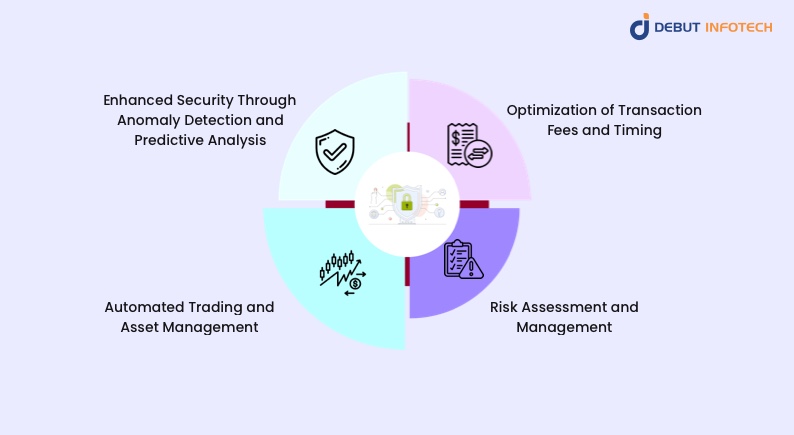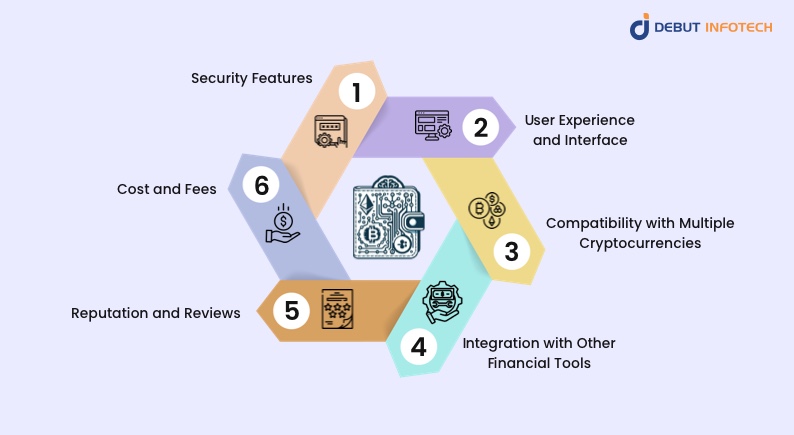Table of Contents
Home / Blog /
AI Integrated Smart Crypto Wallet: The Future of Secure Transactions
October 15, 2024

October 15, 2024
AI integrated smart crypto wallet revolutionizing the way we manage digital currencies. By leveraging artificial intelligence, these wallets provide enhanced security and smarter transaction management, adapting to user habits and threats in real-time. But what are AI crypto wallets? AI crypto wallets use artificial intelligence to optimize operations, boost security, and personalize experiences.
Recent studies highlight the rapid adoption of AI technologies in financial applications. A report by Mordor Intelligence states that the market for AI in Fintech is projected to grow from $14.79 billion in 2024 to $43.04 billion by 2029, experiencing a compound annual growth rate (CAGR) of 23.82% over the five-year forecast period from 2024 to 2029. This growth stems from advancements in AI-powered white label crypto wallet solutions and rising adoption and trust in Blockchain technologies.
Get ready to uncover the groundbreaking features and benefits of smart crypto wallets integrated with AI. This blog post will guide you through innovative functionalities and real-world applications that not only safeguard your digital assets but also enhance your transaction experiences.
The Evolution of Crypto Wallets
Crypto wallets have come a long way since their inception alongside the first cryptocurrencies. They first emerged alongside Bitcoin in 2009, offering a basic means to store cryptographic keys and interact with blockchain networks. Initially, these wallets were simple software programs designed to store and manage cryptographic keys. They also supported simple send and receive functions.
But as cryptocurrency usage expanded – with digital coins like Bitcoin gaining popularity – so did the features of these wallets. They evolved to support multiple cryptocurrencies and more user-friendly interfaces.
For instance, TRC20 crypto wallet, designed to support TRC20 tokens on the TRON network, are increasingly integrating AI to enhance transaction speed and security.
The shift to advanced crypto wallets arose from demands for better security and functionality. This evolution introduced multi-signature security and hierarchical deterministic structures, enhancing transaction security and efficiency.
Today’s smart wallets manage keys, automate transactions, and enhance security protocols. They also provide various financial services directly through the user interface.
The Role of AI in Enhancing Wallet Functionalities
AI enhances crypto wallets with predictive analytics for fees and confirmation timing. It also automates portfolio management, adjusting holdings based on market conditions and security monitoring.
An MPC crypto wallet utilizes multi-party computation technology for security, a feature that’s complemented by AI’s ability to detect and react to security threats in real time.
They offer personalized experiences and improved security, advancing the technology significantly. These intelligent systems are becoming increasingly crucial as the digital asset markets grow more intricate and intertwined with traditional financial systems.
The Mechanics of AI in Crypto Wallets
AI is integrated into crypto wallets through advanced algorithms that learn from user behavior and transaction patterns. These algorithms can autonomously execute tasks such as predicting market trends, optimizing transaction fees, and managing asset allocation based on predictive analytics.
AI in crypto wallets often includes security features that continuously analyze transaction data for signs of fraudulent activity, using anomaly detection techniques to flag unusual transactions that could indicate a security breach.
Generative AI integration in crypto wallets allows for the creation of complex, adaptive security features that can evolve based on new threats.
Ready to experience the future of cryptocurrency management?
Learn about our AI-integrated smart crypto wallet solutions. Designed to enhance security, increase efficiency, and optimize digital asset management.
Benefits of AI for Security and Transaction Efficiency
The following are some of the immense benefits AI integrated smart crypto wallets bring to the table:

1. Enhanced Security Through Anomaly Detection and Predictive Analysis
As mentioned earlier, smart crypto wallets integrated with AI are more secure than regular wallets. AI systems analyze historical transaction data with machine learning to recognize fraud patterns and behaviors. By implementing anomaly detection, these models spot deviations in real time, potentially stopping unauthorized access or transfers before completion.
Predictive analytics anticipate security vulnerabilities by evaluating past breach data, allowing developers to proactively strengthen defenses.
2. Optimization of Transaction Fees and Timing
AI optimizes transaction fees in the volatile cryptocurrency market by using predictive modeling to assess network congestion and typical costs, adjusting fees dynamically to prevent overpayment while ensuring timely confirmations. These enhance user satisfaction by reducing costs and wait times, and improve the overall efficiency of Blockchain transactions.
The combination of crypto trading bot development and AI can automate trading strategies, making them highly effective for managing investments in volatile markets.
3. Automated Trading and Asset Management
Beyond security and cost management, AI contributes to transaction efficiency by automating trading and asset management processes. Algorithms can execute trades at optimal times, based on learned data about market conditions and price trends, thus maximizing potential gains and minimizing losses.
Cryptocurrency trading bots, empowered by AI, automate trading decisions based on algorithmic market analysis, enhancing trading strategies in crypto wallets.
This is particularly useful in the volatile crypto market, where price swings can occur suddenly and dramatically. AI-driven wallets can react instantaneously, far quicker than a human might, ensuring decisions are made at the most strategic moments.
4. Risk Assessment and Management
AI aids in comprehensive risk management by continuously evaluating the risk associated with particular transactions and portfolio compositions. It can suggest or automatically adjust the user’s asset holdings to balance risk based on changing market conditions and the user’s predefined risk tolerance. This proactive stance helps users maintain a balanced portfolio, mitigating potential losses during market downturns while capitalizing on opportunities as they arise.
By integrating AI, crypto wallets offer a smarter, more secure, and more efficient way to manage digital assets, responding adeptly to the complex dynamics of the cryptocurrency market. These advancements represent a significant leap forward in the technology available to both casual users and serious investors alike.
Comparing Traditional and AI-Enhanced Wallets
Traditional crypto wallets mainly store private keys for authorizing blockchain transactions and focus on basic functions like sending and receiving cryptocurrencies without added intelligence. Security features tend to be basic, and reliant on the user’s ability to manage and protect their private keys.
In contrast, AI-enhanced wallets incorporate advanced machine learning algorithms to provide a host of intelligent features that extend beyond mere storage. These wallets can analyze user behavior, predict market trends, and automate transactions with an emphasis on security and efficiency.
AI integration allows these wallets to offer personalized recommendations, optimized fee calculations, and real-time fraud detection systems that adapt to emerging threats and anomalies.
The SoFi crypto wallet is an example of how traditional finance companies are entering the digital currency space, offering wallets that blend security, user-friendliness, and advanced features like AI.
It’s important to differentiate between a crypto wallet vs exchange; wallets store and manage assets securely, often with AI enhancements, while exchanges are platforms for buying and selling cryptocurrencies.
Technical Challenges in Adopting AI Crypto Wallets
Despite the appeal and benefits that an AI integrated smart crypto wallet brings to the table, there are several technical challenges to contend with. Here are a few of them, arranged in no particular order:
1. Complexity in Development
Integrating AI requires deep knowledge in blockchain and artificial intelligence, raising development complexity and cost. If you hire AI developers, they must ensure AI algorithms operate efficiently within the blockchain’s limited processing capabilities compared to traditional computing environments.
2. Integration with Existing Infrastructure
Many crypto wallets need to interact with various blockchain architectures and other fintech systems. Ensuring that AI functionalities align with these diverse technologies without causing disruptions can be a daunting task. The AI system must be adaptable and scalable to cope with different blockchain parameters and evolving technologies.
3. Data Handling and Processing
AI systems need large data volumes for effective training and operation. Accessing this data in Blockchain environments without compromising decentralization and integrity, poses several challenges. Developers need to balance AI’s data-intensive demands with Blockchain’s secure, anonymous, and often data-sparse nature.
4. Scalability
As blockchain technology itself faces scalability issues, adding AI into the mix complicates this further. AI systems need to be able to operate at scale and handle increasing numbers of transactions and data points efficiently without compromising the performance of the crypto wallet.
Related Read: AI in Crypto Exchange Development
Privacy and Data Security Concerns
These data and privacy security concerns also come to mind:
1. User Privacy
AI systems collect and analyze vast amounts of personal data to enhance predictions and functionalities. In crypto wallets, where privacy is crucial, using AI could raise user concerns about data usage and storage. Ensuring data collection meets privacy standards without compromising AI benefits is a critical challenge.
2. Security of AI Models
As AI models become integral to crypto wallets, they also become targets for attacks. Adversaries might manipulate AI algorithms through model poisoning or adversarial inputs, aiming to cause false predictions or unauthorized actions. Protecting AI models from attacks while maintaining accuracy and efficiency is a significant security concern in blockchain wallet development.
Regulatory Landscape for AI and Cryptocurrencies
The regulatory landscape for cryptocurrencies and AI is not left out:
1. Uncertainty and Variability
The regulatory frameworks that govern the use of AI and cryptocurrencies vary significantly across different jurisdictions. They are often in a state of flux. This variability can complicate ewallet app development and global deployment of AI-integrated crypto wallets, as they must comply with diverse and sometimes conflicting regulations.
2. Compliance and Reporting
Regulators may require that AI systems be transparent and explainable, especially when they are used in financial applications. Ensuring AI-driven actions in crypto wallets are auditable and traceable is technically demanding and costly. Furthermore, integrating AI can complicate compliance with AML and KYC regulations, as systems must identify and report suspicious activities autonomously.
3. Ethical Considerations
Using AI in financial applications like crypto wallets raises ethical questions about algorithmic bias and decision-making authority. It’s crucial to ensure AI systems operate fairly and do not exacerbate biases from their training data. This requires careful monitoring and regular updates to AI models to uphold ethical standards and societal values.
Addressing these challenges requires a multi-disciplinary approach that encompasses expertise in AI, cybersecurity, Blockchain technology, and regulatory compliance. Innovators in this space must remain agile and informed about technological and regulatory developments to successfully navigate these complexities.
Related Read: Global Crypto Regulations Overview
Choosing the Right AI Crypto Wallet
Choosing the right AI-integrated crypto wallet requires evaluating key factors based on individual needs and desired features for effective digital asset management. Among the best crypto wallets available today, those integrating AI technology offer superior security and user engagement.

Here are some factors to consider when selecting a smart crypto wallet:
1. Security Features
Given the high stakes associated with cryptocurrency, robust security is paramount. Choose wallets with multi-factor authentication, biometric access, and advanced encryption methods. AI-enhanced wallets should use machine learning to monitor for fraud, ensuring security measures evolve with threats.
2. User Experience and Interface
A user-friendly interface is key for all users, enabling easy navigation for transactions, balance monitoring, and accessing features. Additionally, AI can enhance user experience through personalized dashboards and recommendations based on usage patterns.
3. Compatibility with Multiple Cryptocurrencies
With the growing crypto landscape, a versatile wallet supporting multiple currencies is essential. Choose one that handles popular options like Bitcoin and Ethereum, as well as emerging altcoins. This is why it is crucial to only work with the best cryptocurrency wallet development company.
4. Integration with Other Financial Tools
The ability to connect with other financial applications, such as trading platforms or tax management software, can enhance the functionality of a crypto wallet. AI-powered wallets that provide seamless integration with existing financial ecosystems can save time and improve overall management.
5. Reputation and Reviews
Research the reputation of the wallet provider. Look for reviews and user testimonials that can provide insights into the wallet’s reliability and customer support. Trusted platforms have transparent operations and undergo third-party audits.
6. Cost and Fees
Understand the fee structure of the wallet, including transaction fees, withdrawal fees, and any monthly maintenance charges. While some AI-integrated wallets may offer advanced features, they should also provide competitive pricing to ensure that costs do not erode your investment gains.
The Future of Crypto Wallets and AI
AI integration with crypto wallets is in its early stages, but innovation is accelerating. Future trends include advanced AI features, improved blockchain synergy, and integration with traditional finance. Asset backed cryptocurrencies provide an additional layer of security and stability. These features are further enhanced when managed through an AI-integrated smart crypto wallet.
Here are the predictions on future trends and technologies in AI integrated smart crypto wallets:
1. Increased Adoption of Machine Learning for Predictive Analytics
More machine learning will be used in crypto wallets as AI technology advances. This can help predict market movements, optimize trading, and offer personalized financial advice. As a result, crypto wallets could become full financial management tools with professional-level insights.
2. AI-Powered Security Enhancements
Future wallets may use AI for behavioral biometrics and real-time threat detection. By monitoring user patterns and detecting anomalies, AI can help prevent unauthorized access and cyber-attacks. For instance, the XDC network supports fast, secure transactions, and wallets designed for XDC crypto benefit significantly from AI-enhanced security features.
3. Integration of AI with Decentralized Finance (DeFi)
Future crypto wallets may merge AI with DeFi, automating lending, staking, and yield farming. AI can analyze market trends to find top opportunities, maximizing returns without manual effort.
4. AI Chatbots and Virtual Assistants for Financial Guidance
Future wallets may include AI chatbots or virtual assistants to simplify complex financial decisions. Understanding user goals, these assistants could recommend strategies for investment, asset allocation, and risk management, making crypto finance easier for non-experts.
5. AI and Quantum Computing Integration
Quantum computing could disrupt the cryptographic foundations of current blockchain systems. As it evolves, AI could create quantum-resistant algorithms to secure crypto wallets in the long term. This synergy may drive innovations in both AI and blockchain, deepening their interdependence.
Conclusion
AI is transforming crypto wallets with features like fraud detection, transaction optimization, and portfolio management. These advancements boost security and usability, making AI wallets superior to traditional ones. As AI evolves, it will further improve digital asset management with smarter solutions. Crypto wallet development cost can vary significantly, especially with the inclusion of advanced AI functionalities that require more complex programming and security measures.
The future of AI wallets is promising, with AI-driven smart contracts and decentralized networks. Interoperability between various blockchain systems is expected to be enhanced. These developments will drive business growth and boost revenue in many sectors and industries.
Elevate Your Crypto Security with an AI-Integrated Smart Wallet
Protect and manage your digital assets effortlessly with Debut Infotech’s AI-powered smart crypto wallet solutions. Our custom-built wallets offer enhanced security, seamless transactions, and intelligent asset management.
Frequently Asked Questions
NEAR (NEAR Protocol) is currently the largest AI token by market cap. It is valued at $5.5 billion. It incentivizes a network of computers to support a platform for developing and launching dApps (decentralized applications).
Artificial Intelligence (AI) coins are cryptocurrencies integrated with AI technologies. They enhance Blockchain operations, personalize user experiences, or enable automated trading.
Adopting AI can pose security risks for companies, including potential software bugs and concerns over sensitive data. This is especially critical for cryptocurrency companies, where a single bug or data breach could result in significant losses of customer funds from exchanges and protocols.
Crypto smart wallets are advanced digital wallets that use smart contracts to enable automatic transactions and enhanced security. They provide features like multi-signature support, automated financial operations, and seamless integration with DeFi platforms for a more efficient and secure user experience.
Smart wallets protect against wireless theft using RFID technology. When your cards are stored inside a smart wallet, the RFID shielding prevents anyone from stealing your personal information. But normal wallets do not have these additional features.
An AI-integrated smart crypto wallet is a digital wallet that utilizes artificial intelligence to manage cryptocurrencies efficiently. It enhances security, automates transactions, and provides real-time insights, streamlining user experience with features like fraud detection and personalized recommendations.
Talk With Our Expert
USA
2102 Linden LN, Palatine, IL 60067
+1-708-515-4004
info@debutinfotech.com
UK
Debut Infotech Pvt Ltd
7 Pound Close, Yarnton, Oxfordshire, OX51QG
+44-770-304-0079
info@debutinfotech.com
Canada
Debut Infotech Pvt Ltd
326 Parkvale Drive, Kitchener, ON N2R1Y7
+1-708-515-4004
info@debutinfotech.com
INDIA
Debut Infotech Pvt Ltd
Sector 101-A, Plot No: I-42, IT City Rd, JLPL Industrial Area, Mohali, PB 140306
9888402396
info@debutinfotech.com



Leave a Comment